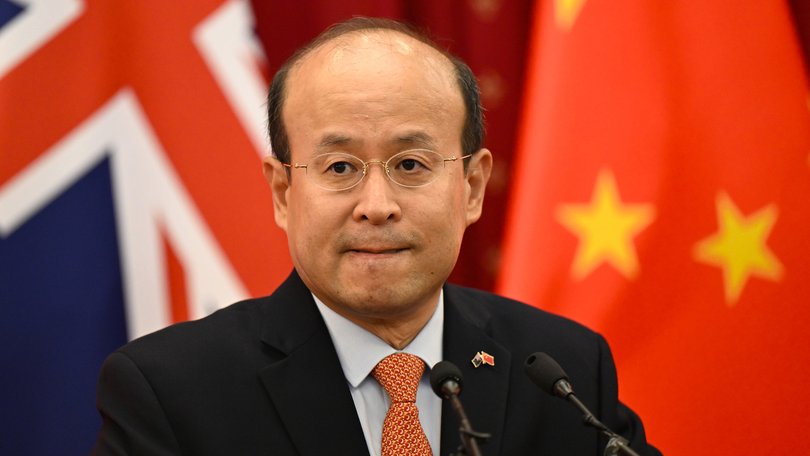Chinese ambassador must be called in for Defence budget intervention: analyst
Xiao Qian must be told he crossed a line by urging Australia to ignore a US request for greater Defence spending, an expert on Australia-Chinese relations says.

A top expert on Australia-Chinese relations has called on the government to immediately summon Chinese ambassador Xiao Qian and rebuke him for warning Australia against increasing Defence spending.
Dr Euan Graham, a senior analyst at the Australian Strategic Policy Institute, a Canberra think tank partially funded by the Defence Department, said China appeared to be exploiting difficulties in the Australia-US relationship by authoring an article on Monday that suggested Australia reject an American request to raise defence spending to 3.5 per cent of the economy.
“This is a very unusual intrusion into sensitive policy making from a foreign ambassador and it should be treated as such,” the author of Australia’s Security In China’s Shadow told The Nightly. “I would have the ambassador called in on no uncertain terms.
Sign up to The Nightly's newsletters.
Get the first look at the digital newspaper, curated daily stories and breaking headlines delivered to your inbox.
By continuing you agree to our Terms and Privacy Policy.“This shows an emboldened quality to weigh in, perhaps because there is a tension between Australia and its main ally, the US. No doubt under orders from Beijing, they see an opportunity to wedge drive.”
The comments from China’s top diplomat in Australia and the reaction to them demonstrate how the Albanese government is caught between pressure from the US to spend more on defence and from China to opt out of what looks like a regional arms race.
Defensive spending
When asked about the comments, Anthony Albanese, who is yet to meet President Donald Trump and has rejected his administration’s Defence budget request, referred to his government’s plan to increase spending to more than 2.3 per cent of gross domestic product by 2033.
“The Chinese ambassador speaks for China,” the Prime Minister said in Canberra Monday morning. “My job is to speak for Australia and it’s in Australia’s national interest for us to invest in our capability and to invest in our relationships and we’re doing just that.”
Mr Xiao wrote in The Australian that China’s defence budget is equivalent to 1.5 per cent of its economy and it has never initiated a war or “occupied an inch of a foreign land” in more than 70 years.
Experts questioned the accuracy of both statements. In 1979 several hundred thousand Chinese soldiers crossed into northern Vietnam, beginning a one-month war that killed more than 50,000 Vietnamese.
China’s 2025 defence budget, which was published two months ago, put spending at $375 billion. Analysts at the Heritage Institute, a right-wing US think tank, said the figure was “implausibly low” and the true number is likely between $500b and $690b. Australia’s Defence budget next financial year is $59b.
Mr Xiao argued that China’s military spending is defensive and other countries — he did not name the US — have “hyped up the so-called China threat”.
“Such rhetoric and actions are steeped in Cold War mentality, blatantly creating division, fuelling a global arms race as well as threatening world peace and stability, which warrants our high vigilance,” he wrote.
Washington meeting
The Department of Foreign Affairs and Trade did not have any immediate comment when asked what action, if any, might be taken against Mr Xiao. There is a diplomatic convention that ambassadors do not participate in domestic policy debates.
The Trump Administration regards China as America’s primary global competitor and wants allies, including Australia, to build up their military forces to counter what it sees as a threat from China to Taiwan and US dominance in the Pacific Ocean.
Demonstrating its more assertive military posture, the Chinese navy this month sent two aircraft carrier groups beyond the Japanese islands into the Western Pacific for the first time.
Among the strongest China critics in the Trump Administration is Secretary of State Marco Rubio, who is also the president’s acting National Security Adviser.
Foreign Minister Penny Wong is scheduled to meet with Mr Rubio in Washington this week. They are expected to discuss relations with China.
Both politicians have very different approaches towards China. In 2020, when he was a senator, Mr Rubio received an indefinite ban on entering the country for criticism of its human rights record. Ms Wong has prided herself on improving relations with China and securing the removal of trade sanctions imposed under the previous Coalition government.
Mr Rubio has expressed concern about China’s domination of rare earths production, an area where Australia has promised to help. The Albanese government wants assurances the Trump Administration will not cancel the delivery of American-made nuclear-powered submarines under the AUKUS alliance.

